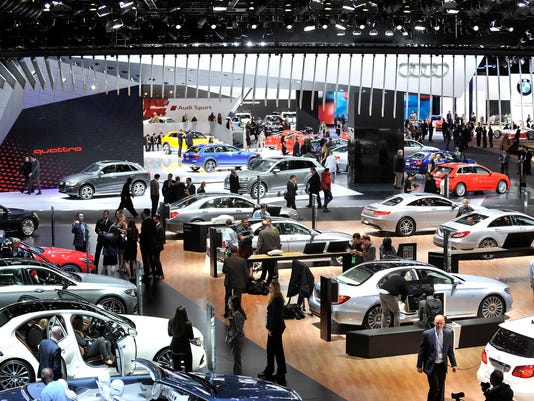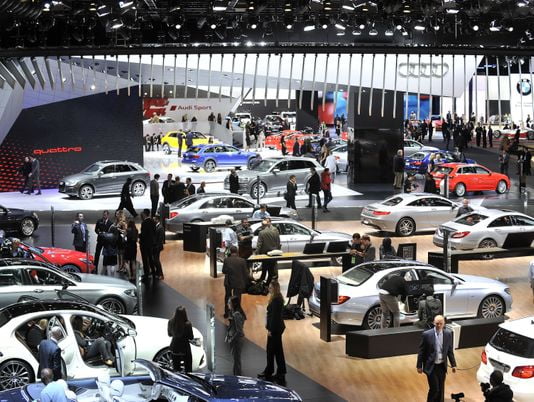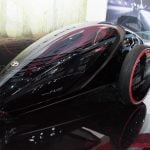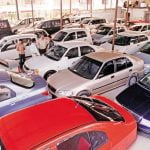
(Photo: Robin Buckson, The Detroit News)
Detroit’s gonna have to wait a dozen days before the fate of its hometown auto show is official, but this much is clear: the nearly 30-year run of the North American International Auto Show is reaching the end of the road.
Automakers are choosing off-site locations to reveal major new products, mostly because they can maximize exclusive coverage of their message. With a few notable exceptions, European brands operating in the United States have all but abandoned Detroit’s annual January confab — and more probably are not far behind, as Toyota Motor Corp.’s North American CEO, Jim Lentz, recently signaled.
The Motor City is not alone. Major auto shows across Europe are losing automakers, too, the natural consequence of comparatively slow growth, marketing tools empowered by the Internet and hunger to showcase vehicles-in-action to would-be buyers because traditional auto shows are so last-century.
The move of the Detroit show to June in 2020, confirmed by ranking industry sourcesclose to the decision-making, would bury once and for all the that’s-the-way-we’ve-always-done-it embrace of Auto 1.0’s traditional auto show in cold, wet January. Good thing, too, because being “first” in the year is proving elusive (thank you, CES in Las Vegas) and insufficient, judging by automakers’ accelerating rate of defections.
That’s why it’s so critical the Detroit Auto Dealers Association, organizers of the annual show, make an appropriately aggressive decision for fast-changing times. It’s why hometown automakers, led by General Motors Co. and Ford Motor Co., are pushing to make the show a cornerstone of an automotive festival.
They see the future cuz they’re living it, making hard decisions to negotiate it. GM’s out of Europe after 90 years. Nearly nine out of every 10 vehicles Ford sells in the United States within a few years will be a truck or SUV. And an auto show model born in the late 1980s has outlived its usefulness to the automakers who pay the bills — exactly why so many are hitting the exits, without apology.
It’s why Ford, a market leader in the United Kingdom, is touting this coming weekend’s Goodwood Festival of Speed for potential ideas that could be adapted for Detroit, its auto show and a reinventing downtown bordering its namesake river and an international border with Canada.
The possibilities? Close to endless, particularly if auto show organizers can summon enough humility to collaborate with partners they simply didn’t have a decade ago. IndyCar Racing’s star owner, Detroit’s own Roger Penske, engineered the return of racing to Belle Isle the first weekend in June. Mortgage mogul Dan Gilbert’s downtown real estate empire teems with restaurants, new and coming hotels, and vibrant commercial activity.
Hometown automakers control property in the city that could become sovereign space during a reconceived auto show — the cavernous lobby of Ford’s Michigan Central Deport in Corktown, GM’s perch on the riverfront, Fiat Chrysler Automobiles NV’s Chrysler House at Griswold and Fort, and its Jefferson North Assembly, home to its Grand Cherokee SUV.
Cobo Center is renovated. Mayor Mike Duggan’s City Hall is delivering services more effectively than probably anytime since the inauguration of the NAIAS in 1989. And his administration generally works to encourage business investment, notwithstanding some challenging aspects of its Community Benefits Agreements.
Billions-of-dollars of private investment in the city — from Gilbert to the Ilitch family’s District Detroit project, and more — are transforming downtown and Midtown, even as Ford’s train station play promises to move the corporate renaissance into the city’s oldest neighborhood. And the riverfront’s industrial past is morphing into a walkable park soon to approach the Ambassador Bridge.
If there’s a time to reimagine, and rename, the auto show to embrace its roots and seize its future, it’s now. Now, while civic energy and enthusiasm are running high; now while automakers are increasingly willing to engage in efforts to improve the city; now while low unemployment and comparatively high growth buoy the national economy.
Transitioning the auto show to June wouldn’t be without its challenges. Could hotels in the downtown core provide enough rooms to satisfy demand likely to exceed the pull felt every January? Not right now. Could DTE Energy Co.’s grid handle the load during a June hot spell? Does the city have the resources to support not just the auto show, but the events planned as part of an automotive festival?
Would moving the show to June weaken the finances of Cobo, just a few years after its renovation and Detroit’s improving reputation made the center competitive in the national convention business? Not necessarily, say people who understand the issues.
One wild card: How much consumer show traffic would be siphoned off to venues outside the Cobo floor? Reduced attendance could affect the show’s stature, even if some kind of automotive festival ended up drawing more people downtown than just an auto show in January.
All fair questions, most of which I’ve heard as evidence grows the DADA is moving the auto show to June starting in 2020. But none of them should be disqualifying for a change that needs to happen before it’s too late.
[“Source-detroitnews”]





